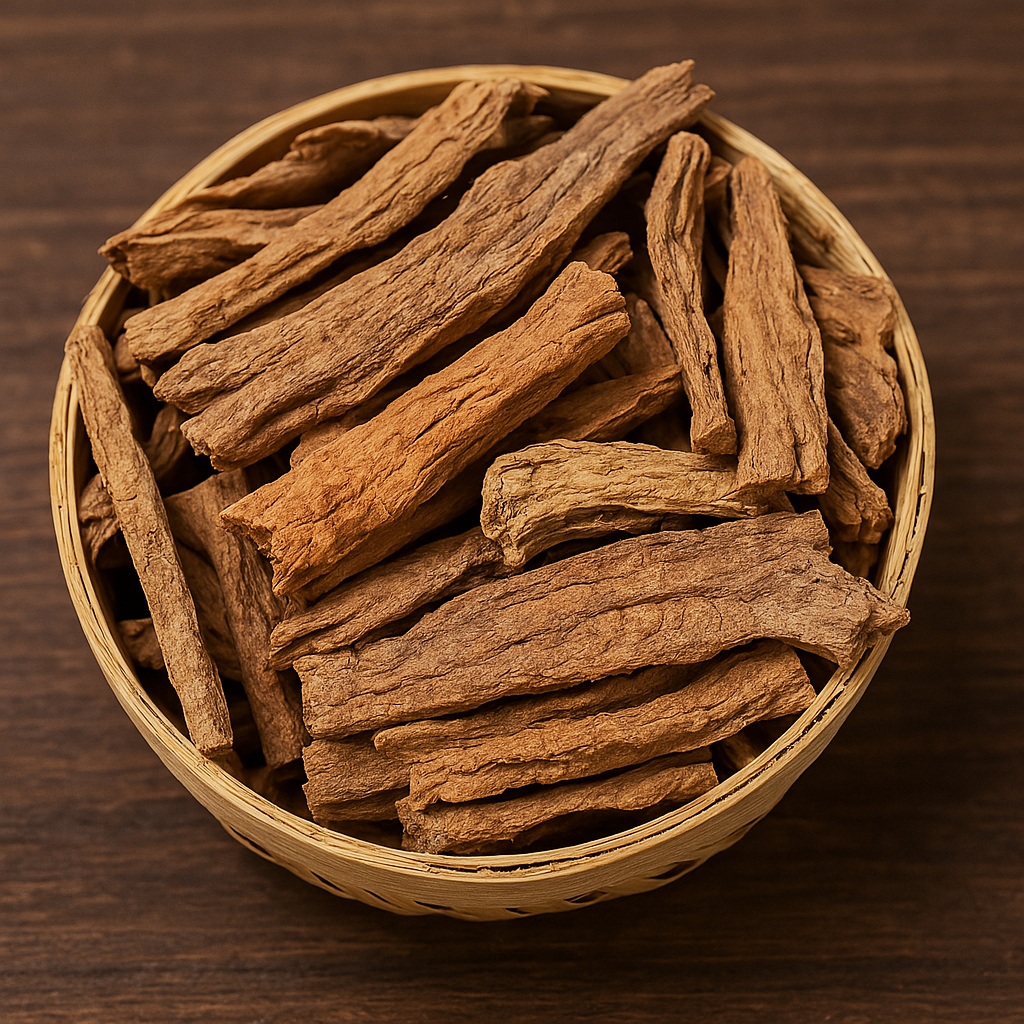Chinese Wolfberry Root Bark Herb

Chinese Wolfberry Root Bark (Di Gu Pi): A Cooling Herb for Heat, Lungs, and Yin Deficiency
Introduction
Chinese wolfberry root bark, known as Di Gu Pi (地骨皮) in Traditional Chinese Medicine (TCM), is a cooling and clearing herb traditionally used to reduce internal heat and nourish the yin of the body. It is especially effective in addressing chronic low-grade fevers, night sweats, and heat from yin deficiency. While it comes from the same plant as goji berries (Lycium barbarum), Di Gu Pi is made from the root bark and has very different medicinal properties. Often used in teas and therapeutic soups, it offers a natural way to support lung health, relieve inflammation, and balance internal heat.
What Is Chinese Wolfberry Root Bark?
Di Gu Pi comes from the bark of the goji berry root, a deciduous shrub native to China. In TCM, it is considered a cooling and bitter herb that targets the Lung, Liver, and Kidney meridians. It is often included in formulas to clear heat from the blood, reduce steaming bone sensations (a TCM term for heat from deep deficiency), and relieve chronic coughs. The bark is typically dried and sliced, and used in decoctions or combined with other herbs in soups.
Health Benefits of Chinese Wolfberry Root Bark
1. Clears Deficiency Heat and Low-Grade Fever
Di Gu Pi is most commonly used to treat yin deficiency heat, such as sensations of internal heat, low-grade fever in the evening, night sweats, or heat following long-term illness.
2. Supports Lung Health and Relieves Cough
This herb is often used in formulas for dry cough or chronic lung issues, especially when caused by heat or yin deficiency. It moistens and clears heat from the lungs while reducing inflammation.
3. Cools the Blood and Reduces Inflammation
Di Gu Pi can help clear heat from the blood and reduce signs of internal inflammation, such as irritability, thirst, red tongue, or skin issues associated with heat.
4. Supports the Kidneys and Bone Health
In TCM, this herb is used to treat “steaming bone disorder,” a sensation of internal heat often felt deep in the bones. It supports kidney yin and is commonly used in menopausal formulas or for individuals with long-term yin deficiency.
5. Combines Well with Other Herbs for Yin Deficiency
Di Gu Pi is frequently paired with herbs like Anemarrhena root (Zhi Mu), Rehmannia (Shu Di Huang), or Ophiopogon (Mai Men Dong) to nourish yin while clearing heat.
How to Use Chinese Wolfberry Root Bark
In Soups
Di Gu Pi can be added to cooling or yin-tonic soups along with ingredients like Chinese yam, goji berries, pork, or duck.
Add 6–12 grams of dried Di Gu Pi to the soup.
Simmer for 1–2 hours to extract its cooling properties.
Strain or remove the bark before serving.
In Tea or Decoctions
This herb is often used in herbal formulas as part of a decoction.
Use 6–10 grams per serving, boiled with other yin-nourishing or cooling herbs.
Simmer for 20–30 minutes for full extraction.
In Powder or Capsule Form
While less common, Di Gu Pi is also available in capsule or powder form. Choose high-quality brands with third-party testing for purity.
Where to Buy Chinese Wolfberry Root Bark
You can purchase Di Gu Pi in:
- Chinese herbal apothecaries
- Specialty TCM clinics
- Online retailers such as iHerb, Amazon, or TCM-focused shops
Look for:
- Dried bark slices (light brown and slightly fibrous)
- Organic or wildcrafted options for better quality and sustainability
- Formulas for yin deficiency or lung heat that include Di Gu Pi
Are There Any Side Effects?
Di Gu Pi is generally safe when used as directed. Because it is cooling in nature, those with weak digestion or cold constitutions should use it cautiously or under the supervision of a TCM practitioner. Pregnant or breastfeeding women should consult a healthcare provider before using this herb.
Conclusion
Chinese wolfberry root bark, or Di Gu Pi, is a cooling, detoxifying herb that clears internal heat, nourishes yin, and supports lung and kidney health. Its unique ability to address long-term heat and dryness makes it a valuable ally in TCM healing traditions. Whether used in tea, decoction, or therapeutic soup, Di Gu Pi is a natural way to cool the body and restore inner balance.
FAQs
Q: Can I take Di Gu Pi every day?
A: It’s best used in cycles or under guidance from a TCM practitioner, especially for yin deficiency or internal heat. Daily use may be appropriate in certain formulas.
Q: What does Di Gu Pi taste like?
A: It has a slightly bitter, earthy taste. In soups or teas, it is typically balanced with sweeter or more neutral ingredients.
Q: Is Di Gu Pi safe for children?
A: Di Gu Pi can be used for children with yin deficiency or chronic cough, but dosage should be carefully adjusted and supervised by a pediatric herbalist or doctor.

